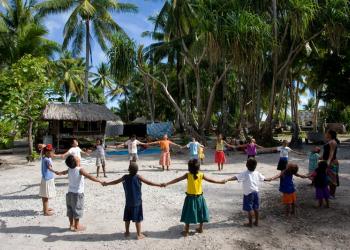Perspective | Education in an Age of Transition
By Daniel Perell
Humans knew not to fall from high off the ground long before they knew the law of gravity. Similarly, while we may not have the language to describe our interconnectedness fully, we must respond to the reality in front of us.
It is apparent to any objective observer that humanity is in an age of transition. Institutions are presently insufficient to address the global nature of the problems we are facing. Our history of community solidarity is being shaken in many parts of the world by an outsized emphasis on individual well-being and material success, while in others that very well-being is sorely lacking due to failures of global solidarity.
And just as a certain kind of education was borne out of the industrial revolution, a new kind of education is necessary to cope with the realities we are facing today.
The current set of contemporary problems we face are different from any we have encountered in the past. Opportunity for voice in the public sphere is growing as quickly as are the disparities in wealth and poverty. Rates of obesity are becoming as challenging a problem as rates of hunger. We live in a world of dichotomies where excess and deprivation exist side by side in an unhappy disequilibrium and where turmoil in one country can cause a breakdown of long-standing relationships in another. Where are solutions to be found?
While the urgency of these problems is undeniable, I find in the notion of global citizenship an opportunity to think critically about the baseline health of humanity. The body of humanity is afflicted and we have a duty to heal it. But treating the symptoms of the disease will not suffice as a cure. The right kind of education can not only address the symptoms, but also the root causes behind the issues affecting humanity so gravely.
The long held understanding of the components of basic education are insufficient for the needs of today: literacy, numeracy, and job preparedness are all important, as are higher-level skills such as critical thinking, problem solving, and analysis. However, certain qualities must now take a more prominent role in our educational system if we are to ensure that their benefits accrue to humanity as a whole.
These include the ability to distinguish truth from falsehood, to identify needs and the means of meeting them, to imagine better and act to bring new realities into being, and to make selfless contributions to collective endeavors. This education must include a moral dimension to inquire into the values driving decision making. In short, education must channel the capacities of the human spirit to work for the betterment of all.
Current educational systems promote economic growth; but is unfettered growth compatible with the limited carrying capacity of the earth? This system exalts the wealthy and defines success through a principally material lens. But how will products of such a system be able to devise solutions to the abject poverty we witness? Can competition, considered indispensable to most modern educational methodologies, bring about the levels of cooperation and reciprocity required in an age of interconnection?
Global citizenship represents the shedding of those elements of culture which serve to divide, while sharing and learning from those that enhance our ability to unite and grow. More than just learning about different cuisines and styles of dress, global citizenship education sees in all individuals and groups the opportunity to offer vital contributions to the rich tapestry that is humanity. We ultimately are one species and our success and failure is collective. It is this very education that can release the emergent powers of the collective and provide a set of tools and models necessary to see ourselves and others as part of a unified endeavor.
This education will not be uniform. It will find different expression in different communities. But there are certain universal, foundational principles on which we can all agree. And there are communities and groups around the world exploring these notions in the most unassuming of circumstances. We should commit ourselves to working alongside them and learning from them.
____
Daniel Perell is a Representative of the Baha’i International Community to the UN in New York.
Follow the Baha’i International Community on Facebook, Twitter and Instagram
